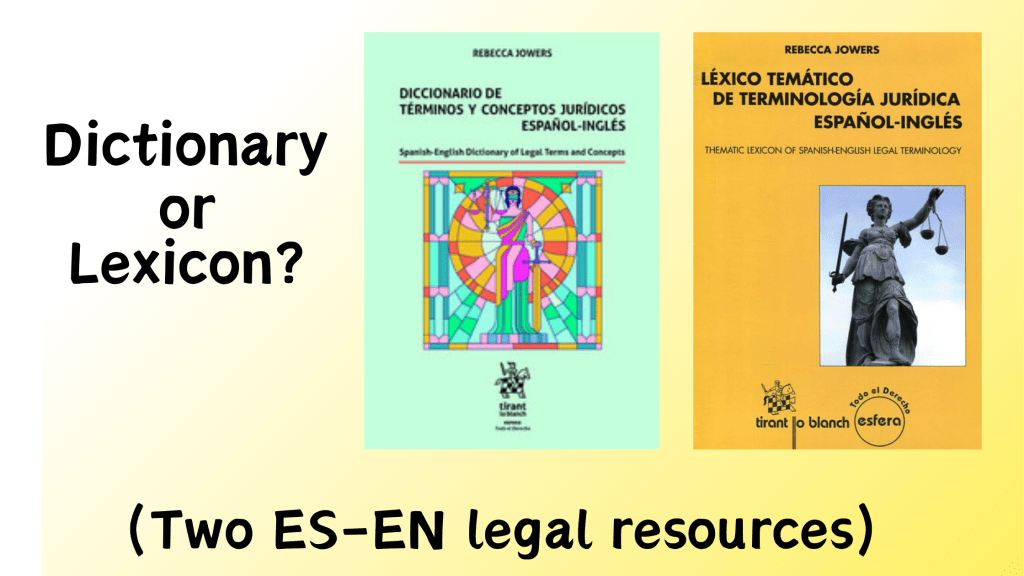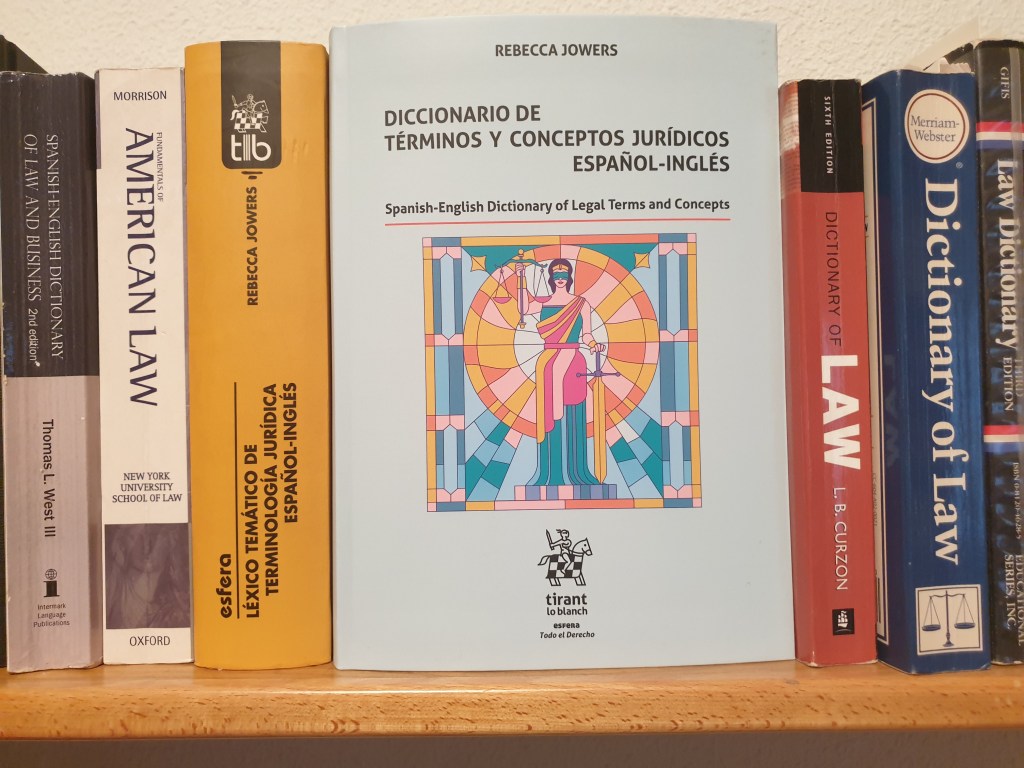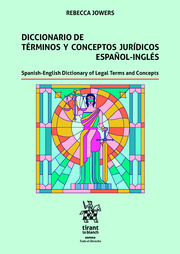
Last week one of the subscribers to this blog asked me which one of my two Spanish-English legal reference works would I recommend for (in her case) someone preparing a translation exam (oposición) and for future translation projects.
Given their different focus, it’s difficult for me to make a recommendation, so I’m providing here a description of each, along with downloadable pdfs containing samples of the content of each.
LÉXICO TEMÁTICO DE TERMINOLOGÍA JURÍDICA, ESPAÑOL-INGLÉS
(THEMATIC LEXICON OF SPANISH-ENGLISH LEGAL TERMINOLOGY)
The Léxico contains over 20,000 legal terms, expressions and concepts from 15 areas of Spanish law with their corresponding English translations. Over a ten-year period I took notes from the major textbooks used in Spanish law schools in each of the practice areas, culling them for the essential legal terminology and concepts. Presenting this as a lexicon rather than a dictionary allowed me to offer this terminology in the context in which it appears in Spanish legal documents in a two-column format in which the original Spanish is accompanied by one (or more) possible English renderings. I originally conceived this as a tool for intensive translator-interpreter terminology training, as well as for lawyers and law professors who require an in-depth knowledge of Spanish and English in the major legal disciplines, including:
Derecho y sistema judicial (Law and the Judiciary)
Derecho procesal civil (Civil Procedure)
Derecho penal (Criminal Law)
Derecho procesal penal (Criminal Procedure)
Derecho penitenciario (Corrections Law)
Derecho del trabajo, Derecho de la Seguridad Social y Derecho procesal laboral (Labor Law, Social Security Law and Labor Procedure)
Derecho tributario (Tax Law)
Derecho de la persona (Law of Persons)
Derecho de los contratos (Contract Law)
Derecho de daños (Tort Law)
Derecho de familia (Family Law)
Derecho de cosas y Derecho inmobiliario registral (Property Law and Property Registration)
Derecho de sucesiones (Law of Succession)
Derecho mercantil (Business Law—includes Derecho societario, i.e., Corporate Law and Law of Business Organizations)
Here is a pdf with a sample of the Léxico’s content (68 pages. It can be read directly in this post or downloaded via the button below):
The Léxico is available here in both print and in ebook from the Tirant lo Blanch legal publishers.
DICCIONARIO DE TÉRMINOS Y CONCEPTOS JURÍDICOS, ESPAÑOL-INGLÉS
(SPANISH-ENGLISH DICTIONARY OF LEGAL TERMS AND CONCEPTS)
With almost 30,000 entries, the Diccionario includes the terminology and concepts contained in the Léxico along with content from my personal legal translation glossaries compiled during my 45-year career as a legal translator and professor of Legal English in the Máster de Asesoría Jurídica de Empresas programa at the Universidad Carlos III in Madrid. Each entry includes an indication of the area of law in which the term is used, one or more possible translations or a brief definition if there is no functional equivalent in English, plus synonyms for the term, if any. The dictionary format enabled me to include terminology from many other legal practice areas in addition to the 15 areas of law covered in the Léxico, including:
Arbitraje (arbitration)
Auditoría (auditing)
Ciencia forense (forensics)
Contabilidad empresarial (business accounting)
Derecho (general) (terms used in several practice areas) (law—general)
Derecho administrativo (administrative law)
Derecho aduanero (customs law)
Derecho bancario (banking law)
Derecho civil (civil law)
Derecho concursal (insolvency law)
Derecho constitucional (constitutional law)
Derecho de aguas (water law)
Derecho de autor (copyright)
Derecho de cosas (property law)
Derecho de daños (tort law)
Derecho de extranjería (immigration law)
Derecho de familia (family law)
Derecho de la competencia (competition law)
Derecho de la competencia desleal (unfair competition)
Derecho de la persona (law of persons)
Derecho de la publicidad (advertising law)
Derecho de la Seguridad Social (social security law)
Derecho de la Unión Europea (EU law)
Derecho de las obligaciones (law of obligations)
Derecho de los consumidores (consumer protection)
Derecho de los contratos (contract law)
Derecho de los seguros privados (insurance law)
Derecho de los títulos valores (negotiable instruments)
Derecho de los transportes (transportation law)
Derecho de marcas (trademark law)
Derecho de patentes (patent law)
Derecho de sucesiones (law of succession)
Derecho del mercado de valores (securities law)
Derecho del trabajo (labor law)
Derecho electoral (electoral law)
Derecho internacional (international law)
Derecho marítimo (maritime law)
Derecho medioambiental (environmental law)
Derecho notarial (law of public notaries)
Derecho penal (criminal law)
Derecho penitenciario (corrections law)
Derecho presupuestario (budgetary law)
Derecho procesal (general) (procedure—general)
Derecho procesal civil (civil procedure)
Derecho procesal laboral (labor procedure)
Derecho procesal penal (criminal procedure)
Derecho registral (law of public registers)
Derecho societario (corporate law; law of business organizations)
Derechos humanos (human rights)
Economía (economics)
Ejercicio de la abogacía (legal practice)
Finanzas (finance)
Formación jurídica (legal education)
Fraseología jurídica (common expressions found in legal texts and contracts) (legal phraseology)
Incoterms (incoterms)
Operaciones comerciales—general (commercial transactions—general)
Propiedad intelectual e industrial (intellectual property)
Protección de datos (data protection)
Sistema judicial (judicial system; organization of courts)
Urbanismo (urban planning)
Here is a pdf with a sample of the Diccionario’s content (75 pages). It can be read directly in this post or downloaded using the button below:
The Diccionario is available here in both print and in ebook from the Tirant lo Blanch legal publishers.









